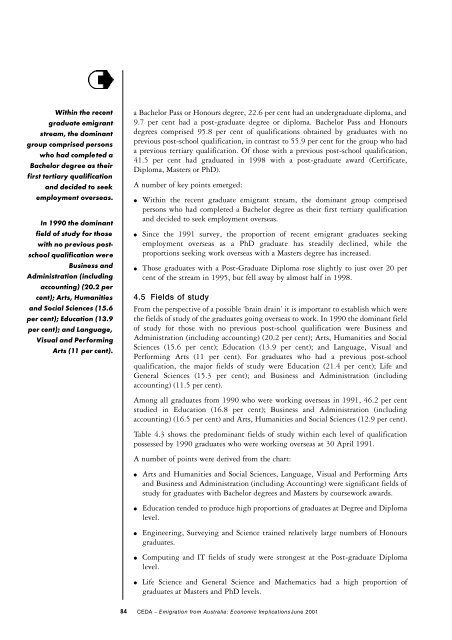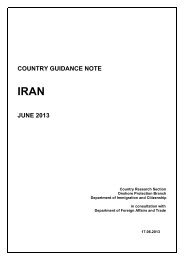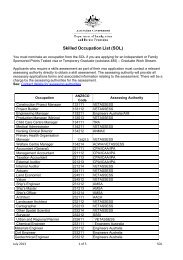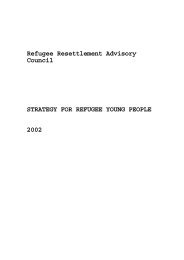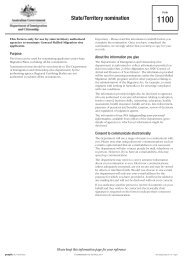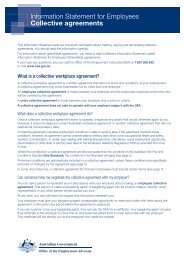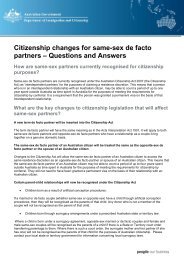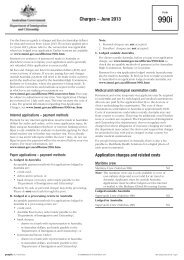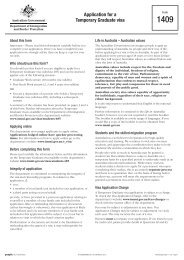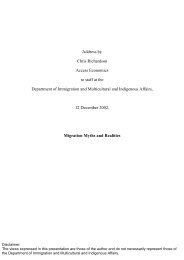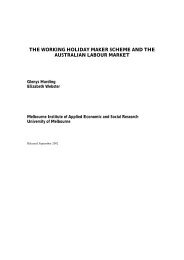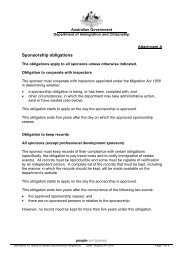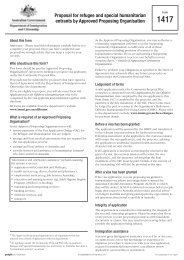part three - Department of Immigration & Citizenship
part three - Department of Immigration & Citizenship
part three - Department of Immigration & Citizenship
Create successful ePaper yourself
Turn your PDF publications into a flip-book with our unique Google optimized e-Paper software.
Within the recent<br />
graduate emigrant<br />
stream, the dominant<br />
group comprised persons<br />
who had completed a<br />
Bachelor degree as their<br />
first tertiary qualification<br />
and decided to seek<br />
employment overseas.<br />
In 1990 the dominant<br />
field <strong>of</strong> study for those<br />
with no previous postschool<br />
qualification were<br />
Business and<br />
Administration (including<br />
accounting) (20.2 per<br />
cent); Arts, Humanities<br />
and Social Sciences (15.6<br />
per cent); Education (13.9<br />
per cent); and Language,<br />
Visual and Performing<br />
Arts (11 per cent).<br />
a Bachelor Pass or Honours degree, 22.6 per cent had an undergraduate diploma, and<br />
9.7 per cent had a post-graduate degree or diploma. Bachelor Pass and Honours<br />
degrees comprised 95.8 per cent <strong>of</strong> qualifications obtained by graduates with no<br />
previous post-school qualification, in contrast to 55.9 per cent for the group who had<br />
a previous tertiary qualification. Of those with a previous post-school qualification,<br />
41.5 per cent had graduated in 1998 with a post-graduate award (Certificate,<br />
Diploma, Masters or PhD).<br />
A number <strong>of</strong> key points emerged:<br />
●<br />
●<br />
●<br />
Within the recent graduate emigrant stream, the dominant group comprised<br />
persons who had completed a Bachelor degree as their first tertiary qualification<br />
and decided to seek employment overseas.<br />
Since the 1991 survey, the proportion <strong>of</strong> recent emigrant graduates seeking<br />
employment overseas as a PhD graduate has steadily declined, while the<br />
proportions seeking work overseas with a Masters degree has increased.<br />
Those graduates with a Post-Graduate Diploma rose slightly to just over 20 per<br />
cent <strong>of</strong> the stream in 1995, but fell away by almost half in 1998.<br />
4 . 5 Fields <strong>of</strong> study<br />
From the perspective <strong>of</strong> a possible ‘brain drain’ it is important to establish which were<br />
the fields <strong>of</strong> study <strong>of</strong> the graduates going overseas to work. In 1990 the dominant field<br />
<strong>of</strong> study for those with no previous post-school qualification were Business and<br />
Administration (including accounting) (20.2 per cent); Arts, Humanities and Social<br />
Sciences (15.6 per cent); Education (13.9 per cent); and Language, Visual and<br />
Performing Arts (11 per cent). For graduates who had a previous post-school<br />
qualification, the major fields <strong>of</strong> study were Education (21.4 per cent); Life and<br />
General Sciences (15.3 per cent); and Business and Administration (including<br />
accounting) (11.5 per cent).<br />
Among all graduates from 1990 who were working overseas in 1991, 46.2 per cent<br />
studied in Education (16.8 per cent); Business and Administration (including<br />
accounting) (16.5 per cent) and Arts, Humanities and Social Sciences (12.9 per cent).<br />
Table 4.3 shows the predominant fields <strong>of</strong> study within each level <strong>of</strong> qualification<br />
possessed by 1990 graduates who were working overseas at 30 April 1991.<br />
A number <strong>of</strong> points were derived from the chart:<br />
●<br />
●<br />
●<br />
●<br />
●<br />
Arts and Humanities and Social Sciences, Language, Visual and Performing Arts<br />
and Business and Administration (including Accounting) were significant fields <strong>of</strong><br />
study for graduates with Bachelor degrees and Masters by coursework awards.<br />
Education tended to produce high proportions <strong>of</strong> graduates at Degree and Diploma<br />
level.<br />
Engineering, Surveying and Science trained relatively large numbers <strong>of</strong> Honours<br />
graduates.<br />
Computing and IT fields <strong>of</strong> study were strongest at the Post-graduate Diploma<br />
level.<br />
Life Science and General Science and Mathematics had a high proportion <strong>of</strong><br />
graduates at Masters and PhD levels.<br />
84 C E DA – Emigration from Australia: Economic ImplicationsJune 2001


